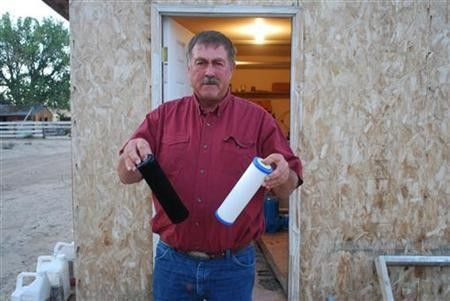Panel seeks more disclosure on natural gas drilling

A federal panel sketched out its first vision of a regulatory roadmap for the booming shale natural gas industry on Thursday, urging more transparency on the use of chemicals and more careful treatment of waste water.
In a report closely watched by leading energy companies who fear higher costs from more government oversight, the panel acknowledged that the risk of the chemical fluids used to crack open shale fissures leaking into drinking water was "remote", but offered a host of ways the industry could win greater public trust for the controversial process of "fracking".
The interim report, to be followed by a final set of recommendations in November, appeared to walk a fine line between shoring up regulations in an industry that barely existed three years ago and stepping lightly enough to ensure that the United States has decades worth of cheap domestic gas.
The U.S. Energy Department's natural gas advisory subcommittee urged regulators to:
* overhaul the management of the millions of gallons of water used in the process and an update to rules to fully protect surface and ground water, with state and local governments creating systems to measure water quality prior to shale gas production, to better evaluate the impact.
* require drillers to release more information about the impact of hydraulic fracturing, which is essential to tapping the nation's plentiful shale gas reserves.
* begin measuring methane and other air emissions from shale gas operations.
While companies have acknowledged that a growing public backlash against fracking is almost certain to provoke greater regulation, firms like ExxonMobil, Chesapeake, Chevron and Devon Energy, the nation's leading shale gas producers, hope to prevent costly new measures that could render their fields uneconomical.
"The specific thing that we believe industry can do and are on the path of doing is to more consistently and with a greater commitment push for best practices and measuring and disclosing the results of what they're doing in the field," John Deutch, the panel's chairman and the former director of the Central Intelligence Agency, told Reuters in a phone interview.
President Barack Obama, who has been vocal proponent of U.S. natural gas production as a source of cheap and relatively clean fuel, called for creation of the advisory panel to tackle growing environmental concerns about shale gas drilling.
Seeking to balance the nation's energy needs against public opinion, the administration could use the panel's recommendations as a framework to promote safer drilling.
LEACKAGE UNLIKELY
Hydraulic fracturing, or fracking, involves injecting a mix of water, sand and chemicals into rock formations at a high pressures to release oil and gas.
Innovations in the technique have led to an explosion of shale gas development, but the expansion has also prompted public backlash. Environmental groups and some landowners believe that the practice has fouled drinking supplies, making livestock and children sick and tap water flammable.
The panel said it "shares the prevailing view that the risk of fracturing fluid leakage into drinking water sources through fractures made in deep shale reservoirs is remote."
"Nevertheless the subcommittee believes there is no economic or technical reason to prevent public disclosure of all chemicals in fracturing fluids, with an exception for genuinely proprietary information," the report said.
ACCELERATE DISCLOSURE
In response to public concerns, some companies have begun releasing more details about the composition of fracking fluids, but the panel said "progress needs to be accelerated."
The panel's report called for the creation of a national database to compile information about shale gas wells.
The industry should also establish an organization to improve operating techniques, the report said.
The release of more data will not only help to reassure the public, but will help regulators develop new rules and better address potential environmental hazards, Deutch said.
The panel's report underscores the need for natural gas drillers to change their practices, green groups said.
"The report's sobering recommendations show just how wide the gap is between the protections that are needed and the protections that we have now," Earthjustice President Trip Van Noppen said in a statement.
Concerns over fracking have led to calls for more federal regulation, which is currently mostly exempt from oversight by the Environmental Protection Agency under the Safe Drinking Water Act.
While this matter was outside the scope of the panel, Deutch said "it is a subject that deserves examination."
The panel, which gathered its information over 90 days, will hold a public meeting discussing its findings next week.
© Copyright Thomson Reuters 2024. All rights reserved.



















